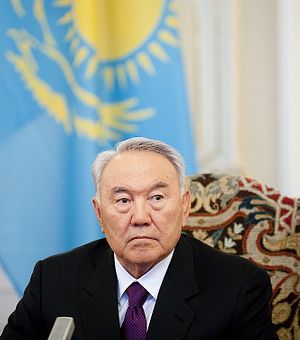In a new report, the International Crisis Group says that Kazakhstan is facing a stress test–its only president since independence turns 75 this summer and Russia’s “actions in Ukraine cast a shadow over Kazakhstan.” To date, the report notes, Kazakhstan’s devotion to continuity has trumped needed democratic reforms. Nursultan Nazarbayev’s recent landslide reelection demonstrates his absolute centrality to political stability in the country and could prove to be “a serious vulnerability.”
The report encourages Kazakhstan to act soon–reconfirming its independence from Russia and lifting the veil on government operations in order to reassure citizens and foreign powers “that the state is not the work of one man or an exclusive ethnic project and that the transition to a post-Nazarbayev era will be smooth.” The report recommends that Kazakhstan continue to pursue a multi-vector foreign policy by engaging equally with Russia and the EU; take a “recognizable role” in pursuing a solution to the Ukraine crisis; give senior officials–other than Nazarbayev–some stage time; practice restraint in issues of language, ethnicity, and nationalism; and broaden economic development beyond Astana.
This is not the first time parallels have been drawn between Ukraine and Kazakhstan. Kazakhstan, like all of Central Asia, had a sizeable ethnic Russian population when the Soviet Union dissolved. That population has dwindled; in a country of 17 million a 2009 census determined that ethnic Russians accounted for 23 percent, ethnic Kazakhs more than 60 percent. This is a more modern development, as it wasn’t until the mid-1980s that the ethnic Kazakh population bypassed that of ethnic Russians in the region. Now, most ethnic Russians are concentrated along the northern border with Russia.
Earlier this month The Guardian’s Shaun Walker wrote that “since the annexation of Crimea last year, chatter about Russia seizing northern Kazakhstan has been moved from the realm of fantasy to plausible medium-term threat.” Recent fears are fundamentally linked to Putin’s stated logic for intervening in Ukraine as a defense of ethnic Russians and his comments in August 2014 that Nazarbayev “has created a state on a territory where there has never been a state. The Kazakhs never had a state of their own, and he created it.”
Putin’s comments did not sit well with many in Kazakhstan, the state quickly organized a celebration for the 550th anniversary of the Kazakh state. Walker notes that some historians have derided the date, saying it was “plucked from thin air.”
Nazarbayev has perhaps overemphasized ethnic unity in the country. In the days after his re-election he commended the nation for coming together and demonstrating “the unity of a multiethnic nation that overcomes all obstacles.” But Crisis Group says that Kazakhstan may be deluding itself with overly rosy slogans regarding ethnic harmony in the country. “Astana needs to recognise that national and ethnic unity since independence in 1991 has been a thin construction, far too dependent on fealty to Nazarbayev.”
A booming economy has kept Nazarbayev comfortably in power, deferring the need to address regional issues and uneven growth. But dropping oil prices and the rippling effects of Western sanctions on Russia over the Ukraine crisis have slowed Kazakh economic growth, which the report notes is “the glue binding the wealthy to the president,” to a crawl.
Although Nazarbayev has consistently emphasized unity in Kazakhstan and carefully walked the line balancing Russia and other powers while continuing to define the country as independent–such as its involvement in mediating the Ukraine crisis. Nonetheless, Crisis Group joins a chorus urging Nazarbayev to clarify what will happen in Kazakhstan once he’s gone:
Without enactment of repeatedly promised political, social and economic reforms, Kazakhstan risks becoming another brittle authoritarian regime that can too easily be manipulated by outside forces.

































